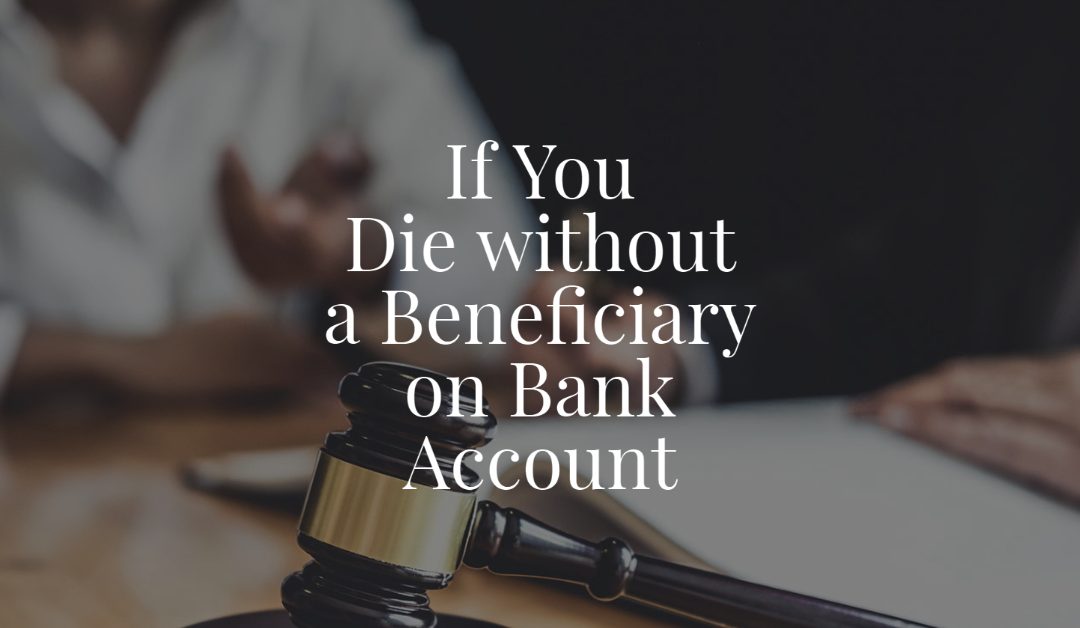The consequences of not planning for your death can make life for your family more difficult. If you have a bank account with no joint ownership and with no designated beneficiaries, the money in that account will be frozen and have to go through probate before distribution to your heirs. Probate can be a long and costly process that is better avoided when possible.
Probate Process in NC
Probate is the court process that every estate goes through after someone dies. If your estate is worth less than $20,000 (or $30,000 if married), you can choose to go through a simplified process in North Carolina. If you die with a will, the process of probate is a bit faster because the court understands what your wishes are. Dying without a will can make the probate court process more complicated as the court uses intestate laws to determine where the assets should go.
The process of probate includes paying all of the valid claims by creditors against your estate . This can include Medicaid Estate Recovery which can send a bill of $300,000 or more for the expenses of whatever Medicaid care you received while living. After all claims are paid, the heirs get what is left over based on your will or based on Intestate laws if you die without a will.
Bank Accounts With Right of Survivorship or POD
If your bank account is jointly held in North Carolina, it is likely a right of survivorship account where the funds automatically go to the joint owner of the account if one dies. If you are the sole owner of an account with a POD (payable on death) clause, the money in your account automatically pays out to your beneficiary who is listed. The beneficiary would only need documents to prove who they are and a death certificate to retrieve the funds from the bank.
To prove the right of survivorship, your bank account must conform in language to North Carolina laws and mention a right of survivorship or payable on death (POD) right. Your account can be held at a bank, savings bank, credit union, or savings and loan. Bank accounts that have the right of survivorship or a payable on death clause do not automatically become the property of the estate when someone dies and they do not usually have to go through any probate processes later on.
However, an appointee of the probate court, such as an executor of the will or a personal representative of the court can choose later to use money from the account to pay the claims described below, only “after all of the other personal assets of the estate have been exhausted.
- The surviving spouse’s year’s allowance
- The decedent’s funeral expenses
- The cost of administering the decedent’s estate
- The claims of creditors of the decedent
- Government claims
Even then, only the decedent’s proportionate share is available to pay the claims and only up to the claim amounts.” (1)
Joint Bank Account Without Survivorship or POD
With probate court, if you have a will, you named an executor to settle your estate. If you do not have a will the court appoints a personal representative, usually from the family, to represent the interests of the estate. Part of their job is to account for all of the property and accounts held by the decedent.
If you have a jointly held bank account without “right of survivorship” or a “payable on death” clause, the portion of the account belonging to you automatically becomes property of the estate upon your death. The estate then uses your portion of the account to pay any claims necessary to the estate before giving any money to heirs.
For example, if you and your sister, Mary both made deposits to a joint account without the right of survivorship and you die, your share would automatically become part of your estate. Your share would be used to settle any claims needing to be paid by the estate and would then pass to your heirs or beneficiaries based on your will or on intestate law. Mary’s share would still belong to her.
Sole Bank Account Without POD
If you have a will, the probate court honors your requests for how money should be handled and who should handle your estate. The executor you name in your will works to pay the claims made on your estate in probate court and then pays the beneficiaries of your estate in whatever way you declared in your will. However, without the POD, it can take 6 months to 2 years for probate to reach the point where beneficiaries receive their inheritance.
If you die without a will and have not named a beneficiary or POD, the personal representative appointed by the probate court of the estate handles the assets including money in bank accounts. These are distributed among heirs based on intestate laws in North Carolina at the end of the probate process.
Find Help
If you are in the middle of dealing with a probate issue now, contact a knowledgeable probate attorney to help you determine what steps to take next. It can be exhausting and stressful waiting to find out what is happening during the process of probate and family members often need a helping hand to understand what is happening and how to expedite the process. If you are making plans for yourself and the future of your estate and want to understand more about how to plan, our probate attorneys would be happy to discuss your options with you.
- https://www.sog.unc.edu/file/226/download?token=ennBOqk4#:~:text=As%20has%20been%20stated%2C%20when,property%20of%20the%20decedent’s%20estate.

